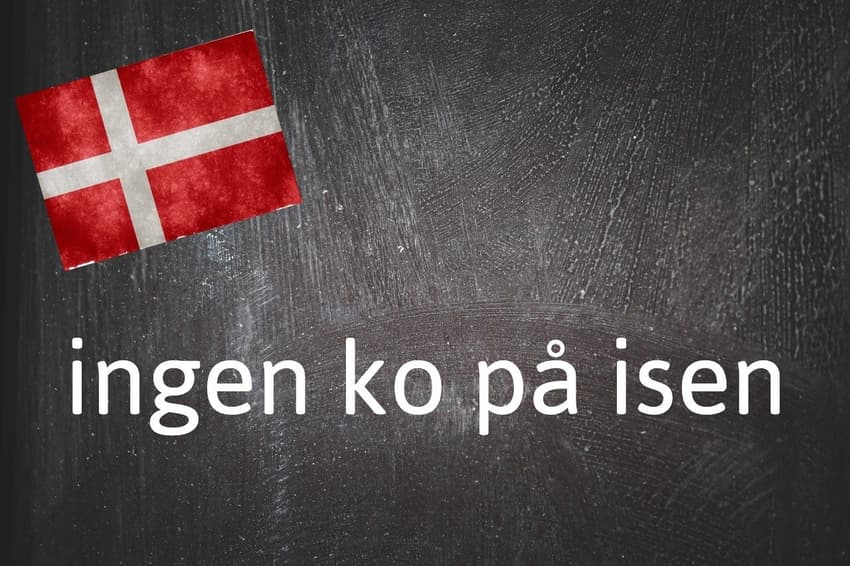Danish expression of the day: Der er ingen ko på isen

Photo by Francesco Ungaro on Unsplash and Nicolas Raymond/FlickR
There's no immediate danger of seeing today's expression of the day play out in real life.
What is ingen ko på isen?
Literally, "no cow on the ice", this phrase would normally be prefaced with der er ("there is") to make it grammatically complete, i.e. "there is no cow on the ice".
However, it's common to hear it with the der er dropped (but still included implicitly), so someone might respond by just saying the four words on their own: ingen ko på isen. Occasionally, and if they're feeling particularly informal (and are perhaps of an older generation), they might throw a du on the end: ingen ko på isen, du!
Du literally means "you" but in the above sentence is like putting a word like "pal" or "mate" on the end for emphasis in US or UK English: "No cows on the ice, pal."
Why do I need to know ingen ko på isen?
So what on earth does this odd Danish idiom mean? The answer is "there's no danger" or "there are no ill effects", so you're most likely to hear it if you ask someone about or mention a potential problem, but your conversation partner has more information than you and responds by saying there's no immediate concern.
As for its origin: According to Den Danske Ordbog, the phrase was once Der er ingen ko på isen så længe rumpen er i land ("There are no cows in the ice as long as the rump is on land").
This makes the idiomatic meaning, "nothing to worry about", a bit easier to understand: you don't have to worry about your cow wandering onto the ice and falling through it if its buttocks are still on land.
Ingen ko på isen is one of a number of Danish expressions that make reference to animals. Som katten om den varme grød ("like the cat going around the warm porridge") and ugler i mosen ("owls in the bog") are two other examples. We'll save their explanations for another day.
Examples
Åh nej, vi er løbet tør for kaffe! - Ingen ko på isen, jeg købte en ny pose i går.
Oh no, we've run out of coffee! - No stress, I bought a new bag yesterday.
Jeg hældte håndsæbe i opvaskemaskinen i stedet for opvaskemiddel, men der var ingen ko på isen.
I put hand soap in the dishwasher instead of washing liquid, but there were no ill effects.
Comments
See Also
What is ingen ko på isen?
Literally, "no cow on the ice", this phrase would normally be prefaced with der er ("there is") to make it grammatically complete, i.e. "there is no cow on the ice".
However, it's common to hear it with the der er dropped (but still included implicitly), so someone might respond by just saying the four words on their own: ingen ko på isen. Occasionally, and if they're feeling particularly informal (and are perhaps of an older generation), they might throw a du on the end: ingen ko på isen, du!
Du literally means "you" but in the above sentence is like putting a word like "pal" or "mate" on the end for emphasis in US or UK English: "No cows on the ice, pal."
Why do I need to know ingen ko på isen?
So what on earth does this odd Danish idiom mean? The answer is "there's no danger" or "there are no ill effects", so you're most likely to hear it if you ask someone about or mention a potential problem, but your conversation partner has more information than you and responds by saying there's no immediate concern.
As for its origin: According to Den Danske Ordbog, the phrase was once Der er ingen ko på isen så længe rumpen er i land ("There are no cows in the ice as long as the rump is on land").
This makes the idiomatic meaning, "nothing to worry about", a bit easier to understand: you don't have to worry about your cow wandering onto the ice and falling through it if its buttocks are still on land.
Ingen ko på isen is one of a number of Danish expressions that make reference to animals. Som katten om den varme grød ("like the cat going around the warm porridge") and ugler i mosen ("owls in the bog") are two other examples. We'll save their explanations for another day.
Examples
Åh nej, vi er løbet tør for kaffe! - Ingen ko på isen, jeg købte en ny pose i går.
Oh no, we've run out of coffee! - No stress, I bought a new bag yesterday.
Jeg hældte håndsæbe i opvaskemaskinen i stedet for opvaskemiddel, men der var ingen ko på isen.
I put hand soap in the dishwasher instead of washing liquid, but there were no ill effects.
Join the conversation in our comments section below. Share your own views and experience and if you have a question or suggestion for our journalists then email us at [email protected].
Please keep comments civil, constructive and on topic – and make sure to read our terms of use before getting involved.
Please log in here to leave a comment.